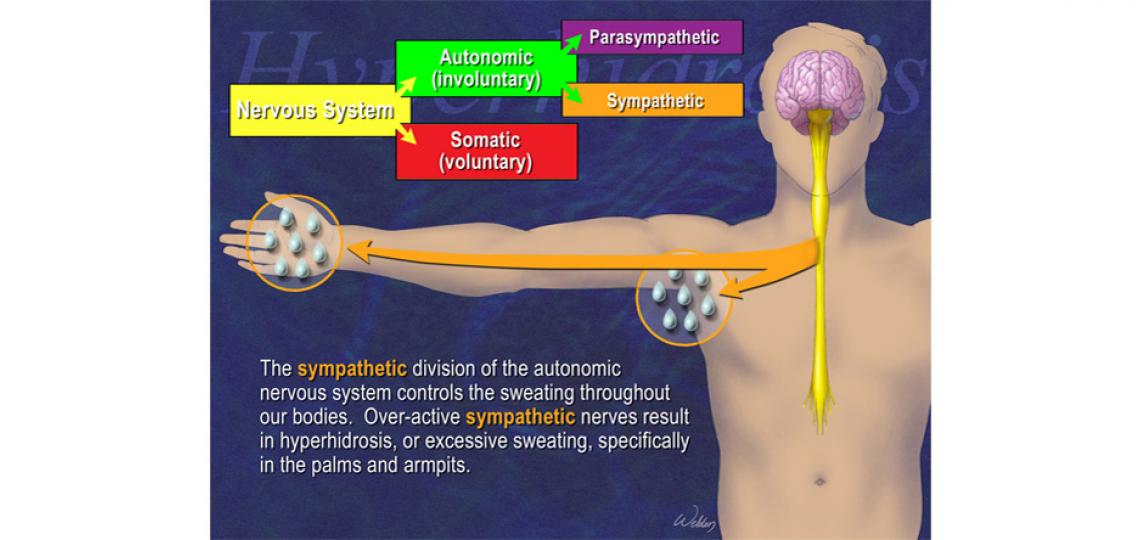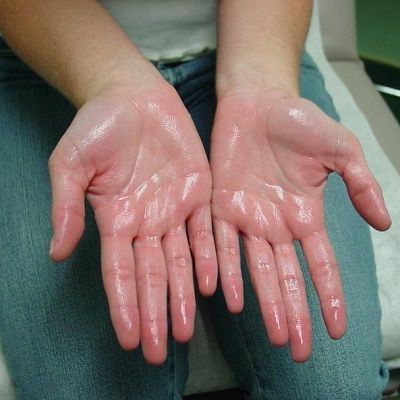Efficient Dermatology Solutions for Excessive Sweating: How to Stop Sweaty Hands and Feet
Efficient Dermatology Solutions for Excessive Sweating: How to Stop Sweaty Hands and Feet
Blog Article
Understanding the Origin Reasons of Excessive Sweating and Its Impact on Life
Too much sweating, also referred to as hyperhidrosis, is a problem that influences a considerable section of the populace, yet its underlying causes and ramifications on day-to-day functioning continue to be rather enigmatic. While it is commonly understood as a physiological feedback to manage body temperature, the triggers for excessive sweating can vary commonly amongst people, incorporating not just physical variables but mental and likewise emotional aspects. Moreover, the influence of this problem expands past mere discomfort, typically affecting social interactions and general high quality of life. By diving right into the origin triggers of hyperhidrosis and exploring its multifaceted effects, a deeper understanding of this prevalent concern can be gotten, dropping light on the complexities that individuals grappling with too much sweating browse on an everyday basis.
Physiology of Sweat Glands
The guideline of sweat manufacturing, an important physical process, is mostly controlled by the activity of sweat glands dispersed throughout the human body. Sweat glands are categorized right into 2 main types: eccrine and apocrine glands.
When the body temperature level rises, either because of physical task, high temperatures, or emotional stress and anxiety, the nerves activates the sweat glands to produce sweat. This sweat is composed mainly of water and electrolytes like salt and chloride. The process of sweat production is crucial for maintaining the body's interior temperature level within a slim, ideal range, highlighting the important duty sweat glands play in human physiology.
Triggers for Excessive Sweating
In recognizing the root causes of too much sweating, it is vital to determine the triggers that can lead to this physiological feedback. Physical effort, high temperatures, and spicy foods are additionally understood to trigger too much sweating in individuals vulnerable to this condition.
Furthermore, drugs such as some antidepressants, opioids, and specific supplements can additionally function as triggers for hyperhidrosis. Understanding these triggers is crucial in handling excessive sweating successfully - Exessive Sweating. By determining and addressing the certain triggers that prompt too much sweating in an individual, doctor can create customized therapy plans to ease this problem and enhance the person's quality of life
Medical Conditions Associated
Related to excessive sweating are different clinical problems that can intensify this physical response. One common problem is hyperhidrosis, a problem characterized by unusually raised sweating that exceeds the body's thermoregulatory requirements. This can manifest in focal areas like the hands, soles, underarms, or face, influencing a person's quality of life because of social shame and pain.
Additionally, endocrine conditions such as hyperthyroidism, diabetic issues, and menopausal warm flashes can likewise cause extreme sweating. Hyperthyroidism triggers an overproduction of thyroid hormones, accelerating metabolism and triggering sweating. Diabetic issues can cause sweating episodes, especially during hypoglycemic episodes when blood glucose levels drop too reduced. Menopausal warm flashes, credited to hormonal fluctuations during menopause, can create abrupt and extreme sweating, frequently accompanied by flushing and heart palpitations.
Additionally, infections like endocarditis, tuberculosis, and hiv have actually been connected with evening sweats, a typical symptom recognized to interrupt sleep and influence general well-being. These clinical conditions highlight the varied variety of underlying variables that can add to excessive sweating, demanding extensive evaluation and monitoring by healthcare specialists.
Emotional and Emotional Elements

Effect On Social Communications
Excessive sweating can have extensive effects on a person's ability to engage conveniently in social interactions. The noticeable indicators of sweat spots or damp patches on garments can lead to humiliation and self-consciousness, creating individuals to withdraw from social scenarios. This withdrawal can impact connections, restriction social activities, and impede expert and individual growth.

Additionally, the anxiousness and self-esteem issues coming from extreme sweating can influence interaction and social abilities. People may struggle to focus on conversations, take part in group tasks, or reveal themselves with confidence. This can cause sensations of seclusion and isolation, as social links come to be testing to keep.
Verdict
While it is typically understood as a physiological feedback to manage body temperature level, the triggers for extreme sweating can vary extensively amongst individuals, encompassing not just physical variables however likewise emotional and psychological elements. By diving into the root creates of hyperhidrosis and discovering its diverse effects, a much deeper understanding of this pervasive issue can be gained, losing light on the complexities that individuals grappling with too much sweating navigate on a day-to-day basis.
Physical physical effort, high temperatures, and click here for more info spicy foods are also recognized to set off excessive sweating in people prone to this problem. By determining and addressing the certain triggers that prompt too much sweating in a private, medical care carriers can establish personalized treatment strategies to ease this condition and enhance the person's high quality of life.
Too much sweating can have profound results on an individual's capability to involve conveniently in social communications.
Report this page